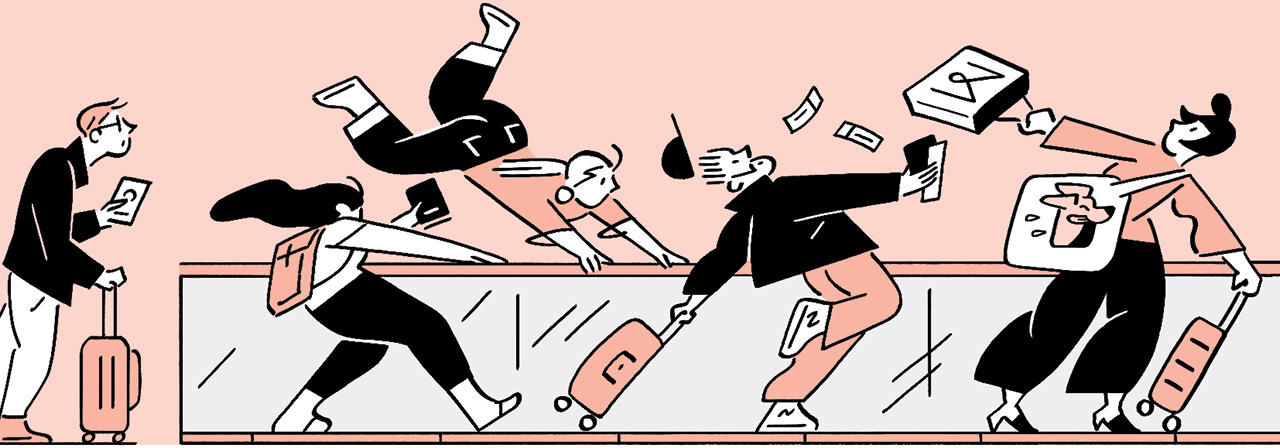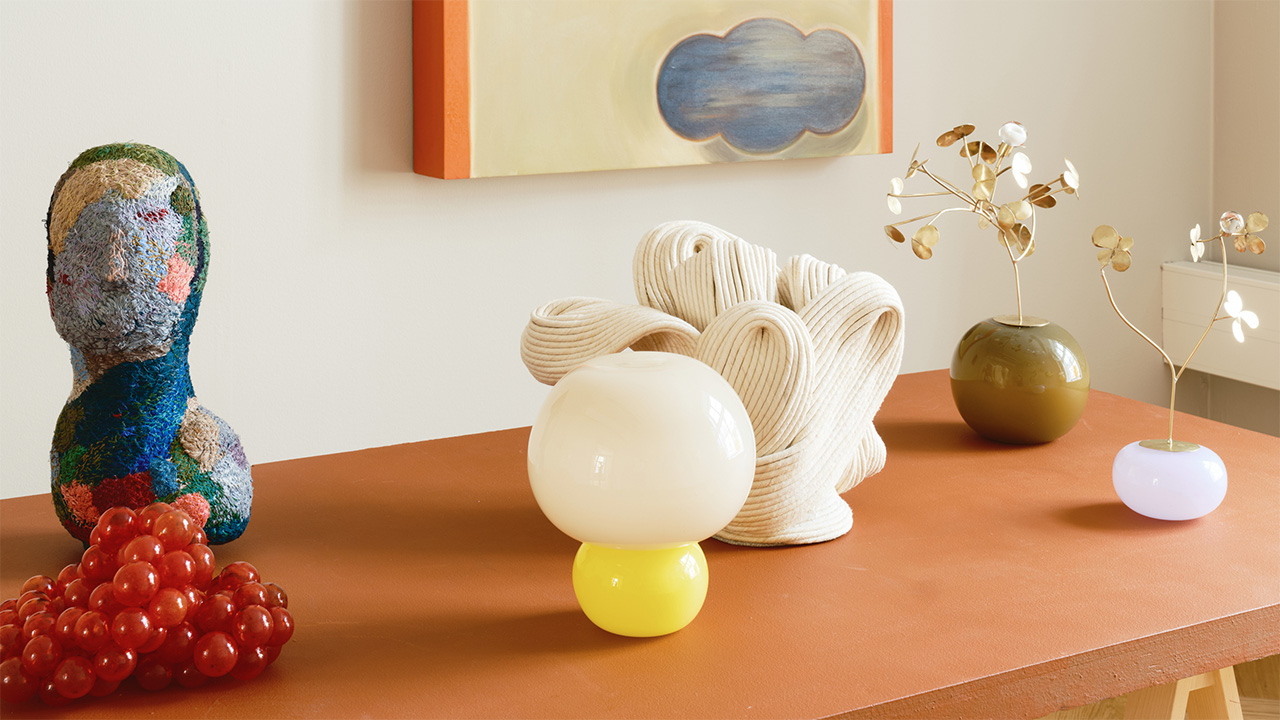Poles plot Spain migration, travelators’ quick advances and Forét reimagines autumn style.
|
Thursday 18/9/25
|

|
|
London
Paris
Zürich
Milan
Bangkok
Tokyo
Toronto
|
|
|
|

Good morning from Midori House. For more news and views, tune in to Monocle Radio. Here’s what’s coming up in today’s Monocle Minute:
THE OPINION: Russian restaurants dominate Dubai
AFFAIRS: Poles plot Spain migration
DAILY TREAT: Forét lifts the season’s palette
IN PRINT: Travelators move quickly in the world of mobility
|
|
No politics at the table: the Russian restaurants taking over Dubai
By Inzamam Rashid
|

|
Dubai Hills could easily pass for a suburb of St Petersburg these days. Drive through and you’ll find Russian cafés, Slavic bakeries and restaurants that wouldn’t look out of place on Nevsky Prospect. My neighbours in Dubai Harbour are Russian, the café on the ground floor of my building is run by Russians and the menu is unapologetically Slavic. Borscht, draniki and beef stroganoff are no longer niche comfort foods for expats – they’re edging into the city’s mainstream dining mix.
This is what happens when geopolitics reshapes migration patterns. Since the war in Ukraine began, circumstances including sanctions have forced many Russians to choose Dubai as their new base. More than two million Russians and Eastern Europeans visited the UAE in 2023, about 13 per cent of the Emirates’ total tourists. By early last year, some 700,000 Russians had secured UAE residency. That influx is remaking neighbourhoods, property markets and, increasingly, the restaurant scene.
A few years ago, Russian restaurants were a curio. Now, press releases for Slavic concepts hit my inbox most weeks. At Gulfood, the world’s largest F&B sourcing event, nearly 100 Russian food companies exhibited across a sprawling pavilion in Dubai this year. The emirate is clearly where Russian culinary entrepreneurs see opportunity and where they’re innovating.

Harbouring Russians: Moscow menus take over buildings in Dubai
Restaurant consultant Alexander Syrnev has had a front-row seat to this evolution. He brought Babushka and Novikov, two successful Slavic concepts, to the city. “When we opened Babushka, it was right as the political situation started,” he told me. “For us, it was a big challenge – people thought that Russian cuisine was just borscht and caviar. We wanted to show that it is heartfelt food that anyone can enjoy.” His restaurants doubled as cultural bridges: a touch of nostalgia for the Russian-speaking crowd but also an introduction for those curious about Slavic flavours.
Russian chefs marvel at how quickly they can source produce here. What has become expensive or scarce in Moscow can be bought in Dubai in a matter of hours. Syrnev recalls a chef telling him, “Dubai is the best city in the world for sourcing. Any seafood, any spice, anything a chef wants, it’s here.” The city’s supply chain, paired with its open wallets, makes it fertile ground for culinary experimentation.
What’s most striking, however, is that even as the war in Ukraine continues, Dubai’s dining rooms don’t mirror the divides of geopolitics elsewhere. I’ve seen Ukrainians happily seated in Russian restaurants, chatting with Belarusian hostesses and Kazakh waiters. The Slavic staff who front these establishments, whether Russian, Ukrainian or otherwise, often work side by side with little friction. It’s a reminder that the UAE operates on a different wavelength: people are welcomed on the strength of their bank balance, their investment and their ability to buy property or open a business. Politics is replaced with transaction.
That doesn’t mean those moving here are devoid of political leanings – far from it. Many bring strong opinions with them, forged by events back home. But Dubai’s promise is precisely that those opinions can be parked at the door. For Russians, Ukrainians and everyone else, the city offers a space where business, hospitality and pragmatism matter more than ideology. Whatever your political leanings, Dubai is a place where people often come to escape politics itself – just as much as conflict and sanction.
But what isn’t as easy is Dubai’s unforgiving restaurant market. More than half of all new concepts fail and Russian restaurateurs are not immune. “Some come here thinking they’re kings and queens,” says Syrnev. “But Dubai slaps them hard. Rents are high, staffing is tough, competition is fierce.” The winners are those who adapt – who tweak menus, appeal to Dubai’s diverse clientele and meet the city’s exacting standards.
Yet the trend is undeniable. You can now order pelmeni on delivery apps, find blini in mall cafés and sit down to a Slavic fine-dining experience that rivals anything in Europe. Dubai has become a laboratory for Russian culinary soft power.
From my vantage point, living in a building where Cyrillic menus greet me downstairs, it feels like something bigger. Dubai has always been a city of hybrids; Lebanese food adapted to Gulf palates, reinvented Japanese cuisine. Russian meals seem next in line. And if history is any guide, once a cuisine takes root here, it rarely stays confined to an expat bubble.
Inzamam Rashid is Monocle’s Gulf correspondent. For more opinion, analysis and insight, subscribe to Monocle today.
|
|
AFFAIRS: poland
After recent drone crossings, Poles use spending power to buy property abroad
As rich Russians head to Dubai, scared Poles are plotting a course to Spain (writes Rory Jones). According to data from the Registradores de España, Polish citizens bought almost 1,000 properties in Spain between January and March – a 25 per cent increase from the same period in 2024. Alongside safety, the cost of living in cities such as Valencia and Madrid is particularly attractive when compared with Krakow, where basic utilities are almost 50 per cent more expensive. The weather helps too. Whereas July is Poland’s wettest month, it is one of Spain’s hottest. Crucially, there are no Russian drone incursions in Spanish airspace and a postcode so far west offers Poles peace of mind, knowing that Madrid sits some 3,500km from Moscow.
|
|
• • • • • DAILY TREAT • • • • •
Brighten your autumn with a colourful piece from Forét
With warm, earthy tones that mirror the hues of leaf-strewn parks, the new collection from Copenhagen-based brand Forét is fitting for anyone whose wardrobe needs a dose of the autumnal. But among beautiful rust-coloured houndstooth trench coats and woollen, khaki knits are flashes of bright colour.
Inspired by traditional pastimes and hobbies, this season’s offering takes its cues from the style of gardeners, birdwatchers and fishermen, with bright-red wool polo shirts and electric-blue sweatshirts resembling lures or ornate flies. Head-to-toe clay-and-brown looks are for drab, landed-gentry types – Forét’s autumn/winter offering is anything but. Monocle has its eye on the brand’s Timber Brushed Polos and its transitional jackets.
foretstudio.dk
|
|
in print: usa
Hold on! Here comes the high-speed travelator
The moving walkway has long been a fringe fascination in the world of mobility. Science-fiction writers from Isaac Asimov to Robert A Heinlein imagined future cities bristling with speedy pedestrian conveyors but the technology hasn’t quite lived up to its potential (writes Tom Vanderbilt). US start-up Beltways hopes to change this. In early 2026, the company will install an accelerator at Cincinnati & Northern Kentucky International Airport to deploy what it claims will be the world’s fastest moving walkway, capable of whisking moving users at a top speed of 8km/h. (Current travelators putter along at a maximum of 3km/h.)

“Transit is only useful if it’s faster than walking,” says John Yuksel, who co-founded Beltways with his brother Matine and envisions his “accelerator” walkways as a last-mile system pulsing through places such as New York’s Times Square. The siblings left jobs in Silicon Valley to start the company and are bringing to fruition an idea first envisioned by their father, Edip, when he was an engineering student at Turkey’s METU university. Edip drew up plans for a modular walkway system that could cut through traffic-choked Istanbul. Previous attempts at faster walkways – the trottoir roulant deployed by Paris’s Metro agency more than 20 years ago or Thyssenkrupp’s Accel system, used in Toronto’s Pearson Airport – ultimately ran aground, largely because of mechanical and financial problems.
The first moving walkway was set up at the World’s Columbian Exposition in Chicago in 1893, before a revised version by the same architect, Joseph Lyman Silsbee, featured at Paris’s Exposition Universelle in 1900. More than a century later, the “street of the future” might be about to arrive – and quicker than you think.
To read more mobility stories, from the future of flying taxis to how bad roads risk European security, pick up Monocle’s September special issue today.
|
|
Monocle Radio: MONOCLE ON DESIGN
Helsinki Design Week at 20, London’s Open House Festival and Zurich Design Weeks
Helsinki Design Week turns 20 this year and we explore this year’s Open House Festival in London. Plus: An interview with the founder of furniture organisation H100 at Zürich Design Weeks.

|
|
| | |